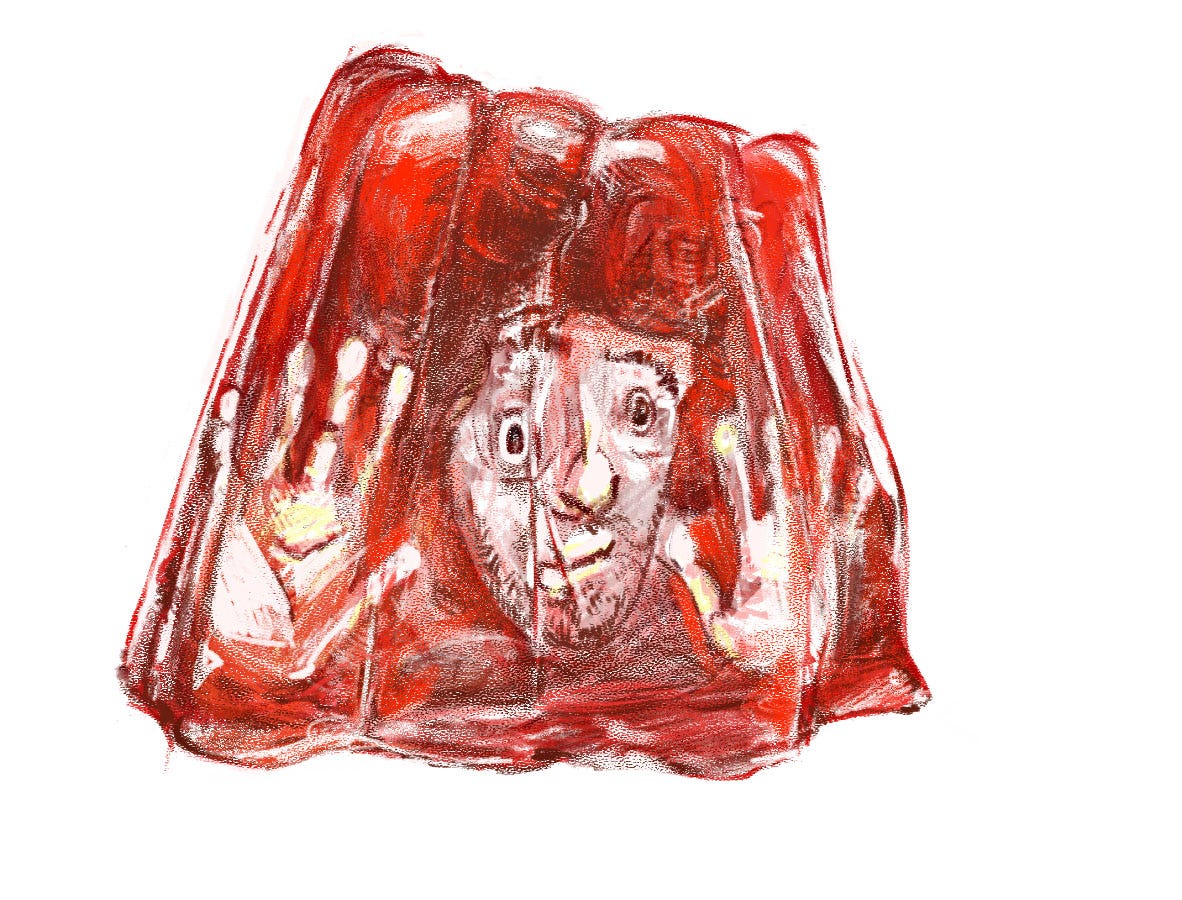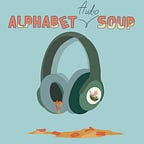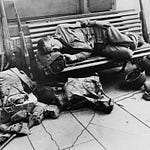When my mom started a family, she decided to leave her demanding job in advertising and find a different source of income. Her two priorities for a new job were that she not have a boss breathing down her neck, and that she be free to take a break every day to make lunch for her kids. Looking back on those lunch breaks, which she and I usually spent together, just the two of us, they now seem like an oasis of stability in a turbulent world. There was always an onslaught of things happening around us: a war at the northern border, a neighbor kid who went missing for days, regime changes, neighborhood disputes, and on and on. But all those remained outside of our little “lunch with Mom” bubble, which was always calm and predictable. The dishes she cooked were familiar and beloved, as were the songs that played on the radio while we ate, and as long as I could keep sitting there, chewing my food, the world around me felt warm and loving and logical. Every day, Mom made two different desserts, and I got to choose. She explained that when you choose something, it tastes better, and because dessert is the comfort at the end of a meal, it should be as delicious as possible. Whichever dessert I didn’t choose would get eaten later in the day, by my dad or my siblings. But even fifty years later, those few seconds at the end of lunch when I made my selection – chocolate mousse, Jell-O, or pudding – still seem like the greatest freedom I’ve ever had. I’ve been trying to recreate that moment since my mother died, and the closest I’ve been able to get is when I write.

The whole incident with Avishai Abudi should, in my opinion, set a red light flashing for us all. You’d be hard-pressed to find a more average Joe. He’s not the type to go around kicking over garbage pails or starting fights in bars. In fact, he never does anything to set himself apart. And yet, one day, out of nowhere, a pair of thugs are banging at his door. They drag him down the stairs, stick him in the back of some van, and haul him straight to his parents’ place. This, with a terrified Avishai in the back yelling, “Who are you? What do you want?”
“That’s not what you should be asking,” the driver says, and the brute at his side is nodding. “What you mean to say is ‘Who am I?’ And ‘What do I want?’” Afterward the two of them laugh as if Avishai’s just told the best joke in the world.
“I’m Avishai Abudi!” Avishai says in a tone intended to sound threatening. “And I want to talk to your superiors. Do you hear me?” That’s when the two of them park the van in the lot outside Avishai’s parents’ building and turn to face him. He’s sure they’re going to hit him and, also, that he doesn’t deserve it. Not at all. “You’re in deep,” Avishai says, careful to protect his face. “You guys have messed up, bigtime!” he says as they pull him out of the van.
But the truth is, they don’t beat him at all. Avishai can’t see exactly what they’re up to, but he senses it. And what he senses is that they are stripping his clothes from him, but not in a sexual way, it’s all very proper. After they’ve finished dressing him back up, they put some sort of heavy pack on his back and say, “Hurry up, run along home to Mommy and Daddy. You wouldn’t want to be late.” And Avishai runs. He runs as fast as he possibly can. He takes the stairs three at a time, until he reaches the brown wooden door to his parents’ apartment. He knocks on it, panting, and when Mommy opens the door, he hurries inside, closes it behind him, and double locks it. “What’s gotten into you?” Mommy asks. “Why are you sweating like that.”
“I ran,” Avishai pants, “in the stairwell. People. Don’t open.”
“I don’t understand a thing,” Mommy says, “but never mind. Come, put your bag down and go wash your hands and face. Dinner’s already on the table.” Avishai takes off the knapsack, goes into the bathroom, and washes his face. In the mirror over the sink he sees that he’s in his school uniform. When he opens the knapsack in the living room he discovers notebooks and textbooks lined in flowered paper. There’s a math book, and a box of colored pencils, and a little metal compass with an eraser shoved on the point. His mother comes over to chide him. “This isn’t the time for homework. Come and eat. Hurry up, chop-chop, before all the vitamins escape from the salad.” Avishai sits at the table and eats in silence. The food is delicious. He’d been surviving solely on takeout and cheap restaurants for so many years, he’d honestly forgotten that food could taste this good. “Daddy left you money for your after-school program.” Mommy points to a sealed white envelope resting on the little hall table next to the rotary phone. “But I’m warning you, Avi, if you pull the same stunt you did with the model-airplane club and change your mind after one class, you’re better off telling us now, before we pay.”
Avishai thinks to himself: It’s just a dream. And after that he says, “Yes, Mommy,” because even if it is just a dream, there’s no need to be impolite. He thinks to himself: If I just will it, I can wake myself at any moment. Not that he knows what, exactly, you do to wake up in the middle of a dream. You can pinch yourself, but that’s generally used in the opposite situation. Pinching is what you do to prove you’re already awake. Maybe he could hold his breath, or just say to himself, “Wake up! Wake up!” And maybe if he simply refuses to absorb everything around him, if he casts doubt, it’ll all suddenly melt away. In either case, there’s no need to stress. He might as well eat first. Yes, after dinner is probably an excellent time to wake himself up. And when Avishai really gets to thinking about it, even when he’s done eating, it’s not exactly urgent. He can go to his after-school group first—he’s honestly curious which one it is—and later, if it’s still light out, he can play a little soccer in the schoolyard. And only when Daddy gets home from work, only then will he wake up. He could even stretch it out another day or two, until right before some especially hard exam. “Now what are you daydreaming about?” Mommy asks, stroking his balding head. “So many thoughts spinning around behind those big, round eyes of yours, just looking at them makes me feel tired.”
“I was thinking of dessert,” Avishai lies, “wondering if you’d made Jell-O or chocolate pudding.”
“What would you like there to be?” Mommy asks.
“Pudding,” Avishai says, all playful.
“It’s already waiting,” his mother says happily and opens the fridge. “But if you change your mind, Jell-O is just as easy. It won’t take a minute to make.”











